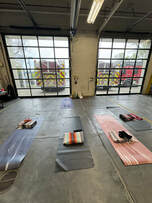Benefits to Yoga for First Responders
Stress management
Joint mobility
Injury Prevention
PTSD (Post Traumatic Stress Disorder) management
Focusing the mind during stress
Regulating the nervous system
Simple tools to practice and decompress
Reducing and preventing back and joint pain
Breath training and practices for improved lung capacity and calming the nervous system
Balance, strength, flexibililty and increased energy
Decrease symptoms of PTSD/work related anxiety and depression.
Quicker reflexes and decision making skills
Yoga for firefighters: Evaluation of a quality improvement program in California fire departments - ScienceDirect Click here to view
Classes taught:
Aventura, Florida Law Enforcement
Miami, Florida for City employees
San Francisco Public Defenders Offices
San Francisco First Responder Firefighter Training
Sonoma County Firefighter and Volunteer Firefighter Wellness Clinic
April, 2024 at the Healdsburg, CA fire station
Upcoming classes:
San Francisco First Responder Firefighter School:
Next session: July-Sept 2024 (partnered with the Y; last session taught Feb-April 2024)
To bring yoga, meditation & stress management to your office/dept:
Contact Stacie:
Tel: 415-939-9642 (YOGA)
Email: [email protected]
Onsite in Marin Country, San Francisco and
Bay Area weekly or as quarterly or one time worshops, online for other areas or onsite for speciality workshops in all areas.
Contact us and let us know your class/workshop needs.
Breath Work for Nervous System Regulation and Concentration for First Responders:
Intro Video
One of the key aspects of yoga that can greatly benefit first responders, as well as everyone else, is breath work. By focusing on breathing techniques, individuals can learn to regulate their nervous system and improve concentration. One simple yet powerful exercise is deep belly breathing. Sit comfortably ina chair or stand with their feet flat on the ground. Inhale deeply through the nose, expanding the belly as much as possible. Then exhale slowly through the mouth, imagining releasing tension and stress with each breath. This exercise can help calm the mind, reduce anxiety, and increase focus during high-stress situations.
Practice this exercise for a few minutes each day to experience the benefits of improved concentration and reduced stress levels. With regular practice, individuals can enhance their ability to stay calm and composed in challenging situations. By incorporating breath work into their daily routine, first responders can equip themselves with a valuable tool for managing stress and enhancing their overall well-being. Incorporating these practices can make a significant difference in how individuals respond to stress. Exploring the power of breath work can help First Resopnders cultivate greater resilience and concentration in their daily lives and as well as at work.
Practice this exercise for a few minutes each day to experience the benefits of improved concentration and reduced stress levels. With regular practice, individuals can enhance their ability to stay calm and composed in challenging situations. By incorporating breath work into their daily routine, first responders can equip themselves with a valuable tool for managing stress and enhancing their overall well-being. Incorporating these practices can make a significant difference in how individuals respond to stress. Exploring the power of breath work can help First Resopnders cultivate greater resilience and concentration in their daily lives and as well as at work.




